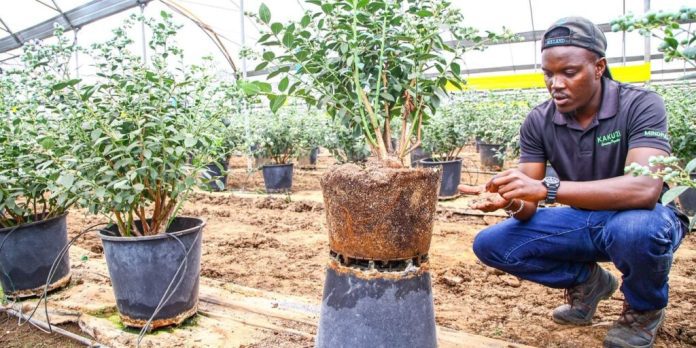Farming has never been a dream for many Kenyans, as they grow up dreaming of pursuing various white-collar professions, such as aviation, medicine, teaching, and banking, among others.
This was the case with Kevin Mbogo, the Irrigation and Maintenance Supervisor at Kakuzi Blueberries.
While his dream was to pursue a career in urban planning, reality diverted him to agriculture, a field he has since fallen in love with.
“I dropped Agriculture when I was in Form Two. When I was joining university, I wanted to study urban planning. That was my first choice. But then I was admitted to study Land Resource Planning and Management. I’ve always been passionate about the environment, but I honestly didn’t know where this course would take me professionally,” the graduate from the Jomo Kenyatta University of Agriculture and Technology says.
He explained that he joined Kakuzi in 2018, where he was tasked with laying the foundation for blueberry farming, including identifying suitable land, surveying, building greenhouses, and constructing an irrigation system.
Stephen Kiprop: Farmer running largest Dorper sheep, dairy farm in Uasin Gishu
“The course is broad; it touches GIS (Geographic Information System), agriculture, water resource management, and land use planning. So, it depends on where your interests fall. I was interested in the geospatial side of things. Using GIS, my undergraduate project mapped fire hazards and resilience in Kibera, Nairobi. As a survey and mapping officer, this skill brought me to Kakuzi in 2018,” he explained.
He now oversees more than 35,000 blueberry plants spread across 20 greenhouses. The blueberries at Kakuzi aren’t planted in soil but in pots, using a system called fertigation where fertilisers and water are delivered via computer-regulated drip systems.
“It’s precision farming. You have to adjust irrigation based on whether it’s sunny or rainy. It’s highly automated, but you still need a human eye.”
While the venture is labour-intensive, Mbogo says it’s lucrative nature makes it attractive. He however, explained that its success is based on various factors such as irrigation timing, pest management, and pruning.
“Harvest happens once a year, but its success is built on hundreds of decisions made every single day; when to irrigate, how to manage pests, when to prune. These decisions must be made quickly and accurately,” he said.








